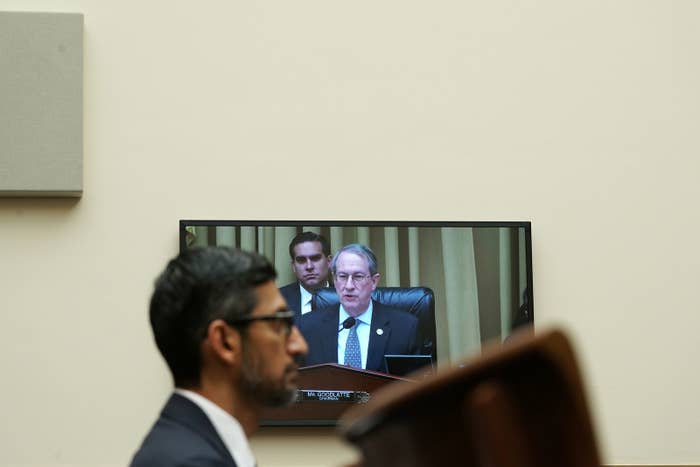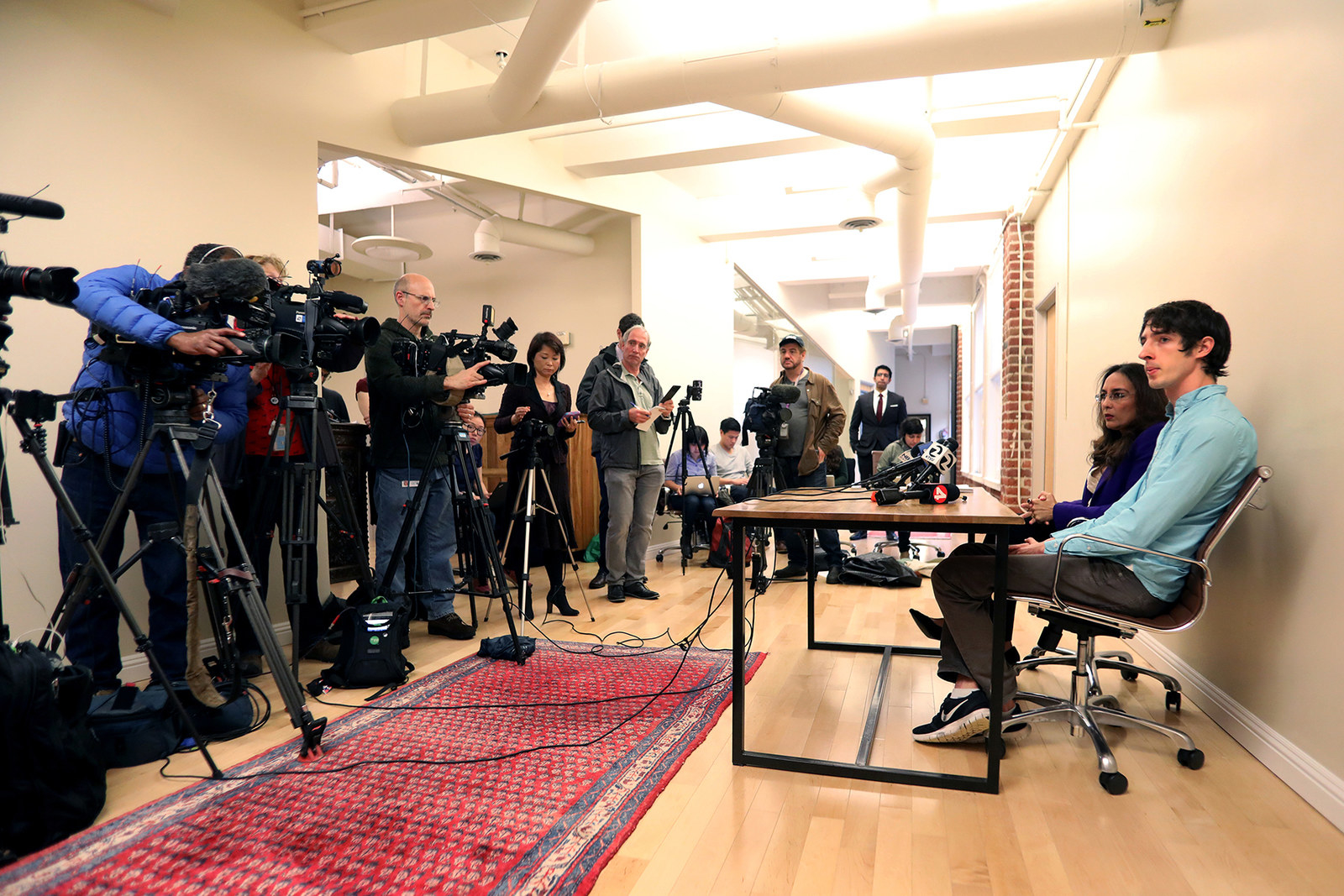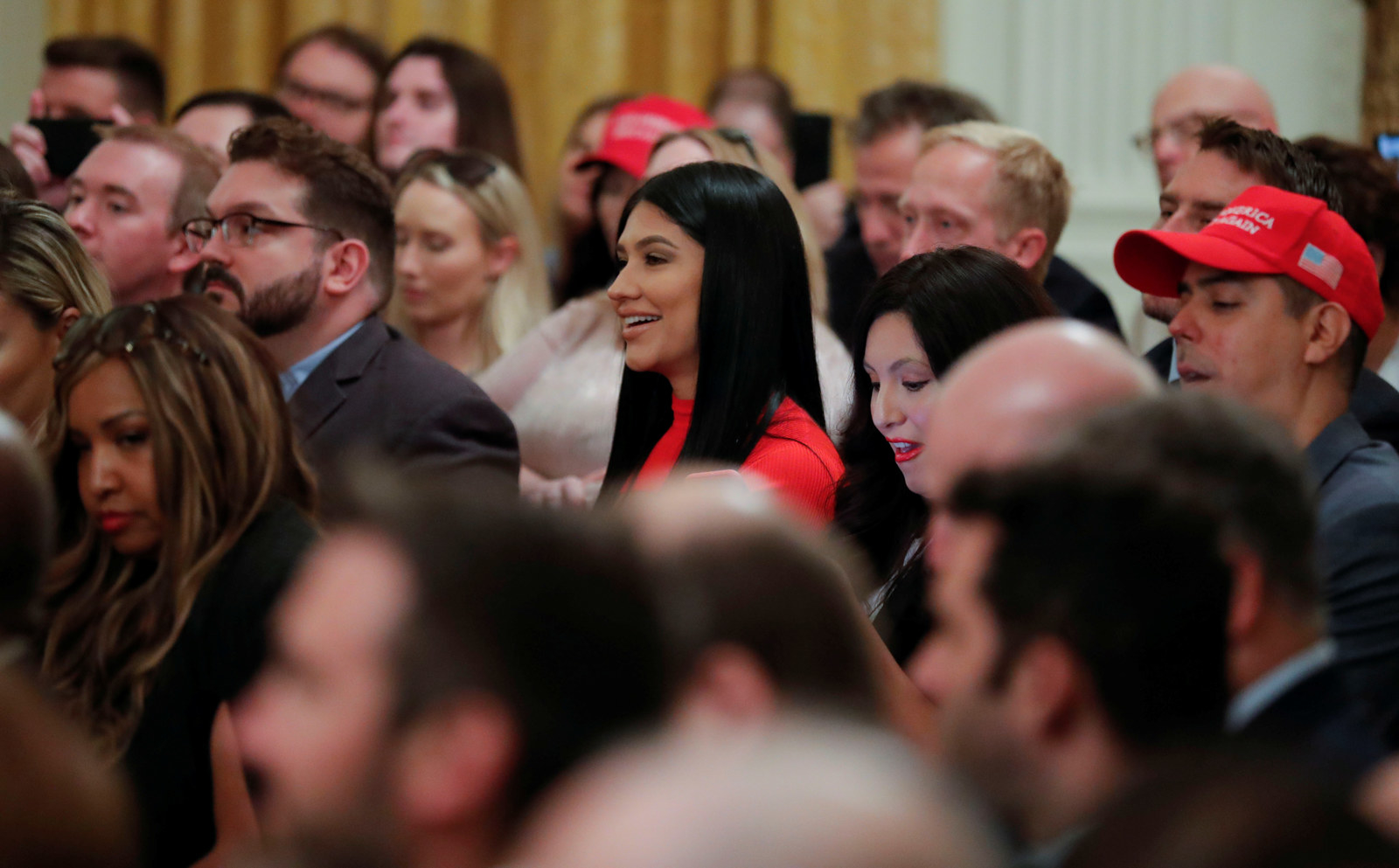
On Jan. 16, Republican lawmakers turned on one of the world’s biggest tech companies.
A month earlier, Google CEO Sundar Pichai told the House Judiciary Committee that his company hadn’t been manually altering search results. But now, Breitbart had published an article that claimed to contain “smoking gun” evidence that Google had indeed. And the Republican members of Congress erupted in anger.
"Does this mean @sundarpichai committed perjury?" Sen. Josh Hawley tweeted. Pichai was "less than truthful," Sen. Marsha Blackburn said. "If Mr. Pichai lied to Congress, he was under oath and it would be a criminal matter for a Grand Jury," said Rep. Louie Gohmert.
Conservative employees inside Google cheered. The leak that hung Pichai out to dry came from one of their own. “We have tons of white- and blacklists that humans manually curate,” said one Google employee in a communication cited by Breitbart. “Hopefully this isn’t surprising or particularly controversial.”

The conservatives’ intent was to generate external pressure on Google — and the Republican lawmakers’ response was exactly what they were hoping for. "There's a growing sense that the problems can't be fixed internally because of the political monoculture," the former Googler said. "They feel more comfortable leaking."
Google had not provided comment at the time of publication.
Over the past two years, some Google conservatives have grown frustrated with colleagues who bashed a military partnership, revolted against an advisory council with a conservative participant, and broadly pursued a left-leaning agenda supporting diversity and inclusion. Now they’re pushing back.
Contact this reporter securely via email: alex.kantrowitz@protonmail.com
Those frustrations spilled out on the anonymous workplace forum Blind — where entry into the subforum community specific to Google requires a corporate Google email address — last month in complaints about the perceived lack of space for their ideology at Google in response to a post asking for signups to an internal Google listserv: “If you’re a real patriot, join the republican email group.”
“This job is too important to me. Joining that list is putting a target on your own back,” replied one Google employee. “Yep. Not risking my livelihood over politics. The extremists rule the roost and I'm just here for the paycheck,” wrote another. “You mean if you want to be targeted and harassed by these outrage mobs and put in a list by HR. Even if I were Republican, I wouldn’t join that,” wrote yet another.
Some conservative discussion on Blind gets ugly. “SJW’s are the real Nazis,” one member wrote last month. “Fuct this place, Thanks SJWs, you ruin everything,” wrote another. (SJW is the initialism for “social justice warrior,” a pejorative term for people concerned with feminism, civil rights, and liberal ideology.)
These frustrations have real-world consequences.
"Things that were unthinkable in the past, like changing or repealing [Section 230 of the Communications Decency Act], like antitrust, they're all on the table for Republicans now in Congress,” the former employee said. Section 230 of the Communications Decency Act grants legal immunity to technology companies for content on their services. The law states that “no provider or user of an interactive computer service shall be treated as a publisher or speaker of any information provided by another information content provider.” And this has been interpreted by some to mean that private companies must take a neutral stance on what is published to their platforms, though 230 does not require neutrality.
“It’s completely unprecedented territory,” the Republican ex-Googler said.

The Battle Inside Google
Two years ago, then-Google engineer James Damore wrote a memo that rocked the company. Titled “Google's Ideological Echo Chamber,” it argued that biological differences might cause gender disparity in employment at Google.
The memo opened a fissure. Hundreds of Google employees wrote to Damore, with many expressing approval, he said in a recent interview with BuzzFeed News. “Mostly messages of support, saying that they agreed with me,” he claimed, “but were too afraid to say so publicly, for fear of their job.”
But an even more forceful contingent of Google employees called for Damore’s head. And after someone leaked the full memo the press, Pichai fired him. “To suggest a group of our colleagues have traits that make them less biologically suited to that work is offensive and not OK,” Pichai said at the time. (Damore subsequently left the Bay Area for Austin.)
Until that point, Google employees mostly handled their disputes internally, but soon all manner of Google internal business spilled out into public. Protests contributed to the end of the company’s Project Maven contract, which provided machine learning technology to the Pentagon’s drones, and torpedoed an external advisory council meant to consult on AI ethics that included Kay Cole James, president of the conservative Heritage Foundation.
Not all employee activism at Google during this period broke down along partisan lines: Employees walked out in protest of a $90 million payout to Android founder Andy Rubin after he was accused of sexual harassment, and rallied against Project Dragonfly, a prototype search engine designed with an eye toward Chinese censorship. Maven itself drew some conservative opposition. “There were almost 5,000 different people who signed [to] cancel Maven from all corners of the political field,” one Google employee told BuzzFeed News. “The liberal/conservative dichotomy is toxic.”
Still, inside the company, some on the right saw the progressive activists as overreaching, and felt little room to push back in open channels. Damore was — and still is — whispered about among some Google employees who agreed with him. As the protests took place, they feared that if they spoke up they’d be shouted down — or lose their jobs.
Feeling unwelcome to air their thoughts inside the company, and recognizing the power of doing so outside, Google’s conservatives have leaked to generate “external accountability.” Most aggressively, they’ve targeted Section 230. The mere threat of the act being amended, or killed, could scare Google into giving conservative content more leeway.
The conservative conduit from Google to Congress was visible last month when provocateur James O'Keefe published a cache of leaked internal Google documents and an interview with a “Google insider” who said that YouTube changed its recommendation engine to suggest CNN, MSNBC, and “left-leaning political outlets” after users watched videos by Tim Pool and Dave Rubin, commentators popular among the right. (In the same video, O’Keefe included hidden camera footage of a Google executive saying the company wanted to avoid a “Trump situation” in 2020. The employee later said she had been set up.)
O’Keefe and the insider talked about Section 230 of the CDA during the discussion. Days later, in a hearing with a Google executive, Sen. Ted Cruz cited Section 230 while discussing the report.

“Google enjoys a special immunity from liability under Section 230 of the Communications Decency Act,” Cruz said. “The predicate for that immunity was that Google and other big tech media companies would be neutral public fora. Does Google consider it a neutral public forum?”
The threat of government action, and changes to Section 230 especially, may be enough to generate change. “Why 230?” a Republican operative told BuzzFeed News. “I can’t think of another thing that people actually know what it is and realize just how important it is to the underpinning of the success of the organization.”

The Spread
In this fight, a small group of employees can wield significant power.
Although it may be a company of 100,000 people, Google attempts to keep itself radically transparent internally. It has hundreds of email listservs, a largely open codebase, a lively internal social media network, and internal documentation widely accessible via Google Docs and Sheets. In this environment, if a politically active employee were willing to comb through the documentation, risk their job, and leak, they could wreak havoc.
A politically moderate Google employee, who recently left the company on his own terms, took a shot in an anonymous blog post at the activists’ leadership this spring, for instance. He called out Meredith Whittaker, an anti-Maven activist and walkout leader, questioning her academic credentials. "I wanted to attract the attention of leadership,” the ex-Googler told BuzzFeed News. “She should not be in those positions of authority, and I don’t think she should continue to be employed by Google.”
Most of Google’s employees don't participate in politics, preferring to concentrate on their work, but now they too are getting angered since this battle is changing how the company operates. “One of the things I really appreciated about the company when I first joined was how open it was,” a current Google employee told BuzzFeed News. “There was an implicit contract there: We are going to tell you the real deal, and you can’t just be live-tweeting it. That contract has been consistently violated and that culture of openness is contracting.”
Another former Google employee said he worries the political battles will weaken the company. “It’s almost run too much like a democracy, and less like a business,” he said. “And when you compare that to the way I understand Amazon to be run, it makes me feel more bullish on Amazon’s prospects as a company of actually getting things done.”
Elsewhere in the tech world, Google’s troubles have drawn notice. “I feel bad for Google,” one Silicon Valley source told BuzzFeed News. “The inmates have taken over the asylum. I care about the same things their employees do, but their approach is self-defeating and just serves to paralyze the whole company."
The most visible political war is taking place inside Google today, but these battles are heating up across the tech world.
Inside Facebook, an internal group called “FB’ers for Political Diversity” has more than 1,000 members. The group was started by Brian Amerige, a former Facebook employee who lambasted the company’s “political monoculture” in a 2018 memo arguing that Facebook employees were intolerant. “We claim to welcome all perspectives, but are quick to attack — often in mobs — anyone who presents a view that appears to be in opposition to left-leaning ideology,” he wrote.
Asked if he could see the environment inside Facebook eventually becoming as intense as Google’s, Amerige, who doesn’t identify as a conservative, said it already is. “The difference seems to be that people are leaking more actual source material from inside Google,” he said. “I wouldn’t say that’s because there’s any less of the same thing happening inside Facebook.”
Amerige was clear about the stakes. “Facebook and Google, in particular, they’re different than most companies. They deal in the world of ideas; they deal in the dissemination of ideas; they have content policies that dictate what can and can’t be shared, and what will and won’t get the full bandwidth of distribution that these platforms are capable of,” he said. “Politics ends up being relevant because political views end up informing the decisions that their content policy ideas are making.”
Trafficking in ideas may be lucrative, but it’s a tricky business. Tech giants are particularly vulnerable to political pressure — and with some of it coming from their own employees, the squeeze from the right is growing.

On Thursday, the Silicon Valley–Washington, DC, pipeline was flowing freely. President Donald Trump hosted what the White House billed as a “Social Media Summit.” Twitter, Facebook, and Google were not invited. But conservative influencers like Sebastian Gorka, Charlie Kirk, and O’Keefe were.
“We have terrible bias. We have censorship like nobody has any understanding or nobody can believe,” Trump said, adding that he would soon be summoning the tech firms. “We’re going to be calling a big meeting for the companies. They have to be here.” ●
CORRECTION
This story has been amended to reflect the fact that CDA 230 is not predicated on neutrality. A caption has also been amended which previously misidentified an attendee at the White House social media summit as conservative activist Laura Loomer. Loomer was not in attendance.
